
Guests
- Mosab Abu TohaPulitzer Prize-winning Palestinian writer and poet from Gaza.
Palestinian writer Mosab Abu Toha has just been awarded the 2025 Pulitzer Prize for Commentary for his essays about the Palestinian experience in the face of the U.S.-backed Israeli assault on Gaza. He joins Democracy Now! to discuss his work, the necessity of advocating for Palestinian rights, and the violence of Israeli occupation. Abu Toha, who evacuated Gaza in late 2023 after being arrested, beaten and detained by the Israeli military, now resides in Syracuse, New York. He says that, while grateful for the platform granted by the Pulitzer, he cannot celebrate the achievement while “my sisters, my brothers and my parents in Gaza are starving.” Israel’s blockade of the Gaza Strip has trapped millions of Palestinians in famine conditions, unable to evacuate and under threat of daily bombings and Israeli troop movements. “The only celebration for me is when there is an immediate and permanent ceasefire in Gaza [and] the West Bank, and when justice and peace are served in Palestine,” says Abu Toha.
Transcript
AMY GOODMAN: This is Democracy Now!, democracynow.org, The War and Peace Report. I’m Amy Goodman, with Juan González.
Israeli strikes on Gaza have killed at least 11 Palestinians so far today, with deadly attacks reported in Khan Younis, in Beit Lahia, in Gaza City. The attacks follow Israeli attacks that killed 54 Palestinians Monday.
Health officials in Gaza say at least 57 Palestinians have already starved to death. The U.N. agency for Palestinian refugees, UNRWA, reported some 66,000 children in Gaza are suffering severe malnutrition due to Israel’s total blockade of food and aid, now in its ninth week. Some Palestinians have resorted to eating turtle meat, grass, rotten or expired food.
One displaced grandmother, Um Mohammad Al-Talalqa, said it took her five hours of standing in a line at a community kitchen in Gaza’s Nuseirat district to get one meal to feed her hungry children and grandchildren.
UM MOHAMMAD AL-TALALQA: [translated] I’ve been coming here since 8 a.m. to the tekia soup kitchen for food to alleviate our hunger and be able to stand up. We are suffering from famine, real famine. I have not eaten anything since this morning. I cannot speak because of hunger.
AMY GOODMAN: On Monday, Israeli Prime Minister Benjamin Netanyahu outlined plans for the stepped-up offensive on Gaza, saying the Palestinian population, quote, “will be moved for its own protection.” He says the whole population must move south. Netanyahu did not say how much of Gaza Israel plans to seize. Reuters reports it could include all of Gaza’s territory.
We’re joined now by the acclaimed Palestinian poet Mosab Abu Toha. On Monday, he won a Pulitzer Prize for Commentary for his writings in The New Yorker magazine. He was praised for his, quote, “essays on the physical and emotional carnage in Gaza that combine deep reporting with the intimacy of memoir to convey the Palestinian experience of more than a year and a half of war with Israel,” unquote. At least 31 of Mosab’s family members have been killed by Israel in Gaza. His books include Things You May Find Hidden in My Ear: Poems from Gaza and Forest of Noise.
First, Mosab, it’s terrible to say, in light of what’s happening in Gaza, to start off by saying congratulations, but, wow, you just won the Pulitzer Prize. Talk about what this means to you and the statement you put out as you learned of this huge honor.
MOSAB ABU TOHA: First of all, I would like to thank you, Amy. I appreciate your work. I appreciate Democracy Now! Thank you so much for your voice.
This honor has brought to me tears and joy. I mean joy, because this is — I mean, this is a big prize. This is something that every writer and — well, writer and artist and journalist dreams of winning. But this is also very sad for me, because the pieces for which I won the prize, the four pieces — I mean, I wrote about seven or eight pieces for The New Yorker. This prize was awarded to four of my pieces. The four pieces are, one for — one about an article that I wrote about starvation in Gaza. The other one was about the difficulty of traveling as a Palestinian. The third one was about the loss of the refugee camp. And the fourth was about the Gaza we leave behind. And unfortunately, as I’m, you know, looking at the titles of these essays, the situation in Gaza is worsening, I mean, not day after day, but minute after minute. And people are dying, and then children are dying of hunger. People are dying for lack of not only food, but also medicine. So, this prize means a lot to me, but it also reminds me that there is a lot to work on, not only by writing, but also encouraging people who have the power to take action to stop all of this.
JUAN GONZÁLEZ: And, Mosab, I wanted to ask you: Given the fact of the continuing attacks of the Israelis in Gaza and the complete failure of the world community to be able to do anything to stop Israel, your sense of what you’re seeing in terms of the American public since you’ve been in the United States in terms of its response to the war?
MOSAB ABU TOHA: I think the American public and also people around the world are eager to learn. I mean, unfortunately, the mainstream media is not doing enough. Israel has been preventing people from visiting Gaza, not only after October 7th, but even before, but especially after October 7th, journalists, medics, a few number, a very, very little number of doctors have been allowed to go to Gaza. I think the American people need to — need to hear more and more voices. I mean, my voice is only one voice that is necessary to hear, but there are so many other voices that are there still in Gaza, journalists and writers and artists and university professors who have so many stories to tell.
My story is one story. My story is other people’s story. But we need to hear more and more people. And I think that the American public is truly eager, and not only eager, but, I mean, they feel the necessity, they feel the duty, to hear and learn about more and more stories in Gaza. And I’m happy that my four pieces that won these awards are stories that I wrote about myself, about my people in Gaza, about the refugee camp where I was born, my family members who were killed, my students, my great-aunt, whose body is still under the rubble until today since last October.
So, there are so many other stories that are to be heard, and I hope that the American magazines and newspapers and American channels, news channels, would open up their spaces to let these writers and people in Gaza share their stories, because this is what we should be doing, at least. I mean, killing people in Gaza is one crime, but also not giving them the space to talk about their pain and also demands, because all the time we hear, you know, politicians. Yesterday, we heard President Trump saying that “We want to help the people of Gaza. We want to — they have to move. We will feed them.” But, I mean, come on. I mean, we are not people who need to be fed. We are not hungry because we don’t have food. We are hungry because we are under occupation, we are under siege, we are under genocide. This is not what people in Gaza want. It’s not that they want only to eat. They want freedom. This is what we want.
AMY GOODMAN: Mosab Abu Toha, I want to turn to you speaking at the Jewish Voice for Peace national meeting this weekend. You read “If I Must Die” by the great Palestinian poet killed in Rafah, Refaat Alareer.
MOSAB ABU TOHA: “If I Must Die” by Refaat Alareer.
If I must die,
you must live
to tell my story
to sell my things
to buy a piece of cloth
and some strings,
(make it white with a long tail)
so that a child, somewhere in Gaza
while looking heaven in the eye
awaiting his dad who left in a blaze—
and bid no one farewell
not even to his flesh
not even to himself—
sees the kite, my kite you made, flying up
above
and thinks for a moment an angel is there
bringing back love
If I must die
let it bring hope
let it be a tale.
AMY GOODMAN: “If I Must Die.” Mosab Abu Toha, you referenced Refaat in winning the Pulitzer Prize yesterday. Talk about your relationship with him, who he was and what he means for the people of Palestine.
MOSAB ABU TOHA: Yeah, I talked a lot about Refaat. I wrote about him. Refaat was a university professor who was murdered, and this is not mentioned a lot. He was not only murdered alone. He was murdered along with two of his siblings and four nephews. Refaat died while he was holding a pen in his hand, while he was wearing his glasses, reading poetry and writing more poems to us, asking us to continue his message, which is the tale of every people who are oppressed by occupation, who are under siege, who are dying in a genocide. ”If I must die / let it bring hope / let it be a tale.” If he must die, we need to tell Refaat’s tale. We need to — I mean, as I said before, if I must die, this is a crime, to be — for someone to die, to be killed by occupation. And we have to remember here that 70% of the population in Gaza are refugees. So, these refugees, they have stories. It’s not that they were killed by an occupation. No, they were killed as they have dreamed all their lives to return to their homeland. So, Refaat died with two of his siblings and four nephews. And in the past, he lost another brother, in 2014.
So, Refaat was not only a writer, he was not only a university professor, but he was also a mentor for so many young writers. He introduced me to the We Are Not Numbers project in 2014, after the Israeli 51-day attacks on Gaza, which claimed the lives of three close friends of mine about whom I wrote in my poetry and in my essays. So, Refaat was more than — I mean, it is a huge loss. And this is why we have to honor his memory by continuing to tell the tales, not only — and when Refaat said, “let it be a tale,” it’s not only Refaat’s tale, because Refaat’s tale, my tale, my grandparents’ tale are the tales of hundreds of thousands of Palestinians. And our tales are not only Palestinian tales. It is a human tale of loss after loss after loss, while the world is watching us.
So, we refuse to die just like that. We will — we will fight to live, not only to live, but also to tell the stories of those who died before us, who were meant to die in blindness, to die in darkness. No, we will live. We will fight. We will continue to speak up, because this loss, the loss of Refaat and so many hundreds of my friends and family members, should not be a waste. We should tell the stories of these people, because we don’t want to lose more people. When we write a poem, it’s not because we feel pain for those who we lost, but we are trying to stir people into action when they feel what we are feeling.
JUAN GONZÁLEZ: And, Mosab, you have been telling the stories of what has been going on there through your poetry and writing, but even in the United States, it has not been easy. The right-wing groups have called for deporting you, and President Trump is cracking down on noncitizens critical of Israel. Talk about the problems you’ve had even being able to speak at many universities.
MOSAB ABU TOHA: I mean, this is the tragedy of being a Palestinian or being pro-Palestinian human rights. You are not safe living in Palestine, for example, in my case, in Gaza. I was wounded at the age of 16 in an airstrike that killed seven people. I lost three close friends of mine in 2014. I was abducted by the Israeli forces in November 2023. I lost my house, which is the family — my family house, in October 2023. Two of my brothers-in-law were abducted by the Israeli forces, and we don’t know anything about them. And I lost so many members of my family, as I said. And I survived, by the way, airstrikes. I mean airstrikes that were just two houses away from me, in Jabaliya camp or in Beit Lahia. So, it is — I mean, to live in Gaza is very dangerous, so I didn’t feel safe living in Gaza.
And now when I’m traveling outside of Gaza, not only in the United States, I don’t feel safe, because, I mean, we are not usually welcome anywhere. It’s not only in the United States, but it’s most of the world. And now when we come to the United States, you know, to raise our families and to share the stories of people who we lost — I mean, I’m not talking about — I’m not talking about another people. So, this is what is different about me as Mosab. I’m not talking about other people. I’m talking about myself. I’m talking about my siblings, about my parents, about my grandparents. I’m talking about the graves of my grandparents, who I will never find, because Israel destroyed cemeteries. I will not take my grandchildren and show them the kindergarten which I attended, not my university from where I graduated in Gaza. I mean, to come here and speak about these things is not even welcome. So, what should I do as a Palestinian? I mean, I don’t know. I mean, this world doesn’t make sense. In Gaza, you will be — you will get killed, wounded or abducted. When you go out and try to speak about these things, you are being chased by these hate groups, these extremist groups. So, what is — what do they want from me?
And when they talk about deportation, I mean, someone would deport someone to their homeland, but my homeland is occupied. I wish I could go back to Gaza. But before you deport me back to Gaza, I need to be in Gaza where Palestine is free. I can’t go back to a country that is not only under occupation, but that is undergoing genocide. So, I would love to go back to Gaza. I mean, it is not my biggest dream to live in the United States. My biggest dream is to live in my free homeland, in Palestine, to be able to visit the original home city and live in the original home city of my grandparents, Yaffa, which is also the name of my 8-year-old daughter. This is where I would like to be deported. I would like to go back and live in a free Palestine.
AMY GOODMAN: Mosab, I want to thank you so much for taking this time to talk with us. I’m so sorry also that you had to cancel your tour all over the country. You apologized to people at all the universities where you were going to be speaking, saying how much you looked forward to sharing Forest of Noise with them. I want to congratulate you on your son’s birthday this weekend, as you were at Jewish Voice for Peace speaking —
MOSAB ABU TOHA: Thank you.
AMY GOODMAN: — and reading your poetry, and also ask if at Syracuse University, where you are now, if they’ll be holding a big celebration. You are now a Pulitzer Prize winner, as was announced yesterday.
MOSAB ABU TOHA: Yeah, I mean, yes, I’m looking forward to celebrate, but, as you understand, it is not easy for me to celebrate anything. I mean, during some of the events, people would be dancing on music. I mean, I do not feel fine, you know, celebrating something. The only celebration for me is when there is an immediate and permanent ceasefire in Gaza and also in the West Bank and when justice and peace are served in Palestine. This is the only reason for me to celebrate. But I can’t celebrate while I know that my sisters, my brothers and my parents in Gaza are starving. You know, I’m sending them this good news, telling them that this is my hope, that my voice would reach more and more people who have the power to intervene and stop the suffering. I can’t just dance or eat, you know, cake or just, you know — I mean, it is not normal for me. But what is good about this is that this recognition, I hope, would prove to be a step towards greater understanding and would stir people in power to take action, to put an end — because I don’t want to continue writing essays and poems about these painful memories and these painful realities.
AMY GOODMAN: Mosab Abu Toha, thank you so much, Palestinian poet and author. On Monday, he won the Pulitzer Prize for Commentary for his essays published in The New Yorker magazine.

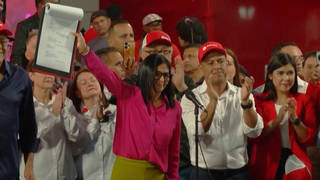
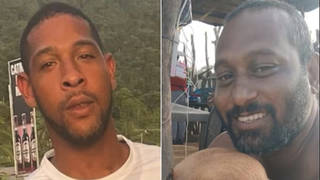
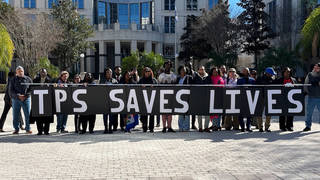
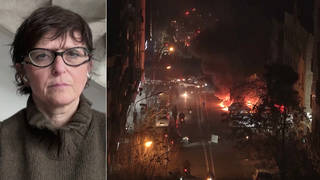





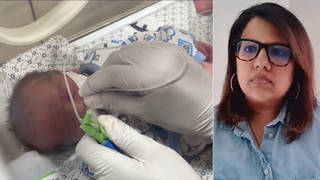

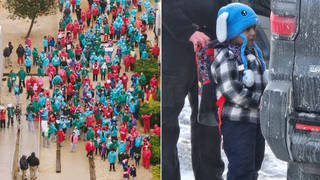
Media Options